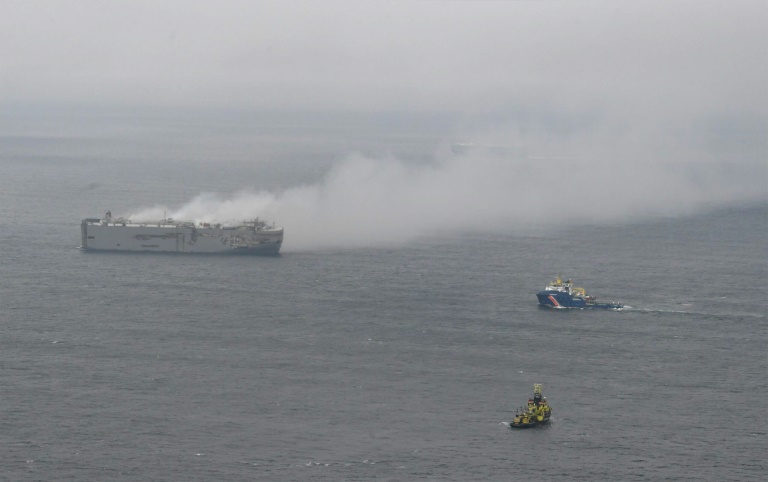AFP
Rescuers were on Friday finally able to board a cargo ship packed with electric vehicles that caught fire off the Dutch coast but authorities said the flames, though less intense, still pose a risk to nearby natural sites.
An electric car is suspected of sparking the deadly blaze and officials said Friday that nearly 500 electric vehicles were aboard, far more than initially reported.
Fire broke out on the Fremantle Highway late Tuesday, killing one member of the all-Indian crew and prompting a massive effort to douse the flames.
“The fire is still raging but diminishing. There is also still smoke,” the Dutch coast guard said Friday, adding that a drop in temperature enabled a rescue team to access the vessel for the first time.
“Rescuers have managed to establish a new, more robust connection with the tug via the ship’s roof. This should make it easier to move the vessel and keep it under control,” a statement said.
Dutch authorities said they have yet to determine a plan to prevent the ship from sinking.
“We are still open to all scenarios. We’ve managed to get a little more control but we have to bear in mind that smoke is still escaping,” coast guard spokeswoman Lea Versteeg told AFP.
Efforts to extinguish the blaze were halted Thursday to prevent the ship from losing stability due to the volume of water accumulating on board.
Japan-based K Line, the ship’s charter company, reported there were 3,783 cars on board the vessel — far more than an initial estimate of around 3,000.
These were “all brand new/no used cars on board” including 498 “electrical vehicle units”, the company told AFP in a statement.
Ship owner Shoei Kisen Kaisha have said there was a “good chance that the fire started with electric cars”, but added that the cause still needs to be investigated.
One sailor died after he and 22 others were rescued from the burning ship that had forced some crew members to jump overboard.
The blaze has raised the spectre of an ecological disaster on a nearby chain of islands, which include Terschelling and Ameland, where the fire was first reported.
The ship remained close to Terschelling and Ameland, which are part of an archipelago of ecologically sensitive islands in the Wadden Sea.
The area spanning the Netherlands, Germany and Denmark has been declared a UNESCO World Heritage Site and has a rich diversity of more than 10,000 aquatic and terrestrial species.
“It seems that the situation on the ship has stabilised somewhat,” Heidi Bunicich, spokeswoman for the Ameland municipality told AFP.
“But of course we are very concerned. We have emergency plans in place to deal with various scenarios,” she said on Thursday.






